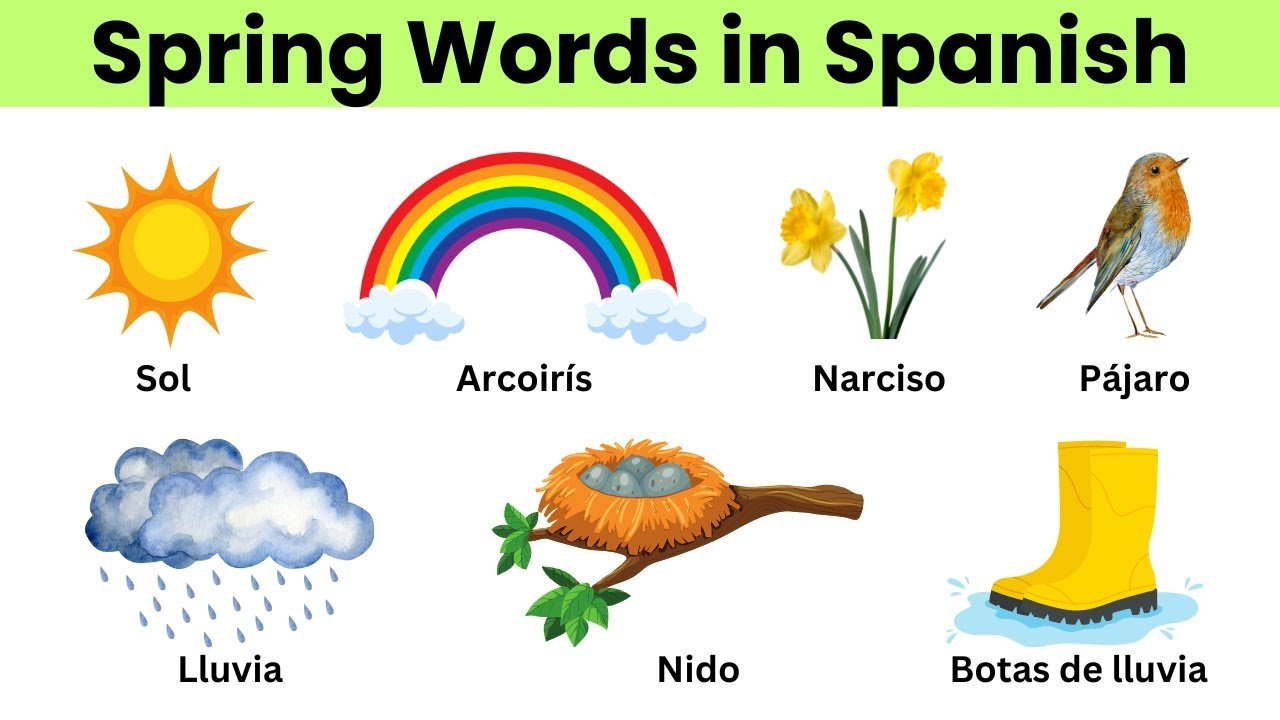Experience The Beauty Of Spring In Spanish: A Seasonal Delight
by Ferrara

Spring in Spanish is translated as “primavera,” a word that dances off the tongue like a gentle breeze carrying the promise of blossoms. The vibrant hues of flowers bloom under the warm sun, infusing life into the world once more. Primavera is a season of renewal, symbolizing hope and rejuvenation after the stark stillness of winter. Dive into the enchanting world of primavera and let its beauty inspire your soul.
Exploring Spring in Spanish: A Colorful Season
Welcome to the vibrant world of spring in Spanish! As the seasons change and nature comes to life, it’s the perfect time to dive into the beauty and culture of this enchanting time of year. In this article, we’ll take a journey through the sights, sounds, and flavors of spring as celebrated in Spanish-speaking countries.
The Arrival of Spring
Spring in Spanish is known as “la primavera,” a time of renewal and growth. In many Spanish-speaking countries, the arrival of spring is celebrated with festivals, colorful decorations, and traditional events. Let’s explore some of the unique ways in which spring is welcomed across different cultures.
Las Fallas in Spain
One of the most famous spring festivals in Spain is Las Fallas, celebrated in the city of Valencia. During this event, elaborate paper-mâché sculptures, known as “fallas,” are displayed throughout the streets and then set on fire in a spectacular display of fireworks and flames. The festival symbolizes the burning away of the old to make way for the new, marking the beginning of spring.
El Día de la Primavera in Argentina
In Argentina, spring is celebrated on September 21st with “El Día de la Primavera,” or the Day of Spring. This holiday is a time for people to enjoy the outdoors, have picnics in parks, and participate in colorful street fairs and parades. It’s a joyful occasion that brings communities together to welcome the new season.
Flora and Fauna of Spring
Spring is a season of blooming flowers, chirping birds, and buzzing insects. In Spanish-speaking countries, the natural world comes alive with a riot of colors and sounds during this time of year. Let’s take a closer look at some of the flora and fauna that define spring in Spanish.
Las Flores
Flowers play a central role in the celebration of spring in Spanish-speaking cultures. From the iconic red carnations of Spain to the vibrant bougainvillea of Mexico, flowers are used to decorate homes, churches, and public spaces during the springtime. Some popular spring flowers in Spanish-speaking countries include tulips, daffodils, and roses.
Los Pájaros
Birds are another cherished symbol of spring in Spanish-speaking countries. As the days grow longer and the temperatures rise, migratory birds return from their winter homes, filling the air with their melodious songs and colorful plumage. From the majestic condors of the Andes to the tiny hummingbirds of Central America, birds add a touch of magic to the springtime landscape.
Springtime Traditions and Customs
Spring is a season rich in traditions and customs, many of which have been passed down through generations in Spanish-speaking communities. These rituals are a way to honor nature, celebrate life, and usher in a new beginning. Let’s explore some of the fascinating springtime traditions from around the Spanish-speaking world.
La Semana Santa in Spain
One of the most significant springtime traditions in Spain is “La Semana Santa,” or Holy Week. This religious festival takes place in the week leading up to Easter and includes elaborate processions, solemn ceremonies, and colorful parades. It’s a time for reflection, prayer, and community gatherings as people come together to remember the story of Christ’s passion and resurrection.
El Día de los Muertos in Mexico
While not traditionally a spring holiday, “El Día de los Muertos,” or the Day of the Dead, is celebrated in Mexico in early November, coinciding with the end of the harvest season and the beginning of winter. This vibrant festival honors deceased loved ones with colorful altars, festive decorations, and offerings of food and flowers. It’s a time to remember and celebrate the lives of those who have passed on, keeping their memories alive in the hearts of the living.
Springtime Cuisine
Spring is a season of fresh flavors and delicious dishes, and Spanish-speaking countries are known for their rich culinary traditions that celebrate the bounty of the season. From fresh fruits and vegetables to savory meats and decadent desserts, the springtime cuisine of these cultures is a feast for the senses. Let’s explore some of the mouthwatering dishes that define spring in Spanish.
Paella in Spain
No discussion of Spanish cuisine would be complete without mentioning paella, a flavorful rice dish that captures the essence of spring with its bright colors and fresh ingredients. Made with saffron-infused rice, seafood, chicken, and a variety of vegetables, paella is a beloved Spanish dish that’s perfect for sharing with friends and family on a warm spring day.
Ceviche in Latin America
In Latin America, ceviche is a popular springtime dish that showcases the region’s abundant seafood and vibrant flavors. Made with fresh fish or shrimp marinated in citrus juices, onions, and herbs, ceviche is a light and refreshing appetizer or main course that’s perfect for enjoying al fresco on a sunny spring afternoon.
Conclusion: Embracing the Beauty of Spring in Spanish
Spring in Spanish is a season of renewal, growth, and celebration, filled with colorful festivals, blooming flowers, cherished traditions, and delectable cuisine. As we welcome the arrival of spring, let’s take a moment to appreciate the beauty and wonder of this magical time of year in Spanish-speaking cultures. Whether you’re dancing in the streets of Valencia during Las Fallas or savoring a bowl of fresh ceviche in Mexico, spring offers a feast for the senses and a chance to connect with nature and community in a meaningful way. Let’s embrace the spirit of spring in Spanish and let its vibrant energy inspire us to bloom and grow along with the world around us.
Spring Love (Spanish Version)
Frequently Asked Questions
What is “spring” in Spanish?
Spring in Spanish is “primavera.”
When does the spring season typically occur in Spanish-speaking countries?
The spring season in Spanish-speaking countries usually occurs from late March to late June, varying slightly depending on the specific region.
What are some common events or traditions associated with spring in Spanish culture?
Common events and traditions associated with spring in Spanish culture include Las Fallas in Valencia, Semana Santa (Holy Week) processions, and the celebration of Dia del Libro (Book Day) on April 23rd.
How do people in Spanish-speaking countries typically celebrate the arrival of spring?
People in Spanish-speaking countries often celebrate the arrival of spring by organizing outdoor festivals, enjoying picnics, participating in floral parades, and engaging in traditional spring cleaning rituals.
Final Thoughts
As we embrace the vibrant season of spring, we are reminded of the beauty and renewal it brings. From blooming flowers to warmer weather, spring rejuvenates our spirits. In Spanish, ‘spring’ is translated as ‘primavera’, encapsulating the essence of new beginnings. Let’s cherish the colorful landscapes and the sense of hope that spring in Spanish represents.
Spring in Spanish is translated as “primavera,” a word that dances off the tongue like a gentle breeze carrying the promise of blossoms. The vibrant hues of flowers bloom under the warm sun, infusing life into the world once more. Primavera is a season of renewal, symbolizing hope and rejuvenation after the stark stillness of…
Contact Us
[contact-form-7 id=”142″ title=”Contact form 1″]
Archives
- October 2025
- September 2025
- August 2025
- July 2025
- June 2025
- May 2025
- April 2025
- March 2025
- February 2025
- January 2025
- December 2024
- November 2024
- October 2024
- September 2024
- August 2024
- July 2024
- June 2024
- May 2024
- March 2024
- February 2024
- January 2024
- December 2023
- October 2023
- September 2023
- August 2023
- July 2023
- June 2023
- May 2023
- April 2023
- March 2023
- January 2023
- December 2022
- November 2022
- October 2022
- September 2022
- August 2022
- July 2022
- June 2022
- May 2022
- April 2022
- February 2022
- December 2021
- November 2021
- October 2021
- September 2021
- August 2021
- July 2021
- June 2021
- May 2021
- April 2021
- March 2021
- February 2021
- January 2021
- December 2020
- November 2020
- August 2020
- June 2020
- May 2020
- March 2020
- January 2020
- December 2019
- November 2019
- October 2019
- September 2019
- August 2019
- July 2019
- June 2019
- May 2019
- April 2019
- March 2019

Categories
- Adventure
- Automotive
- Banking and company services
- Branding
- Business
- CANADA
- casino
- Country
- crypto
- Dating
- Entrepreneur
- Featured
- Finance
- gaming
- health
- Home Improvement
- INDIA
- Industry
- Internet marketing
- Law
- loans
- Marketing
- Merchant
- News
- Online Gaming
- Philippines
- real estate
- SEO
- Shopping
- sports
- Streaming
- Trading
- Transactions
- UK
- USA
- weed
Recent Posts
- What You Should Know Before Applying for a Second Citizenship or Residency
- secrettantric Exclusive Tantric Experiences with Skilled Therapists Across London
- What Are Small Loans and When Should You Use Them
- Blue-Chip Stocks: Stability in Volatile Markets
- Exploring Janineschmidt Nude: A Unique Perspective
- Exploring The Thrill Of Sandlot Dunks: Tips And Tricks
- The Ultimate Guide To Understanding Sole Purpose
- The Truth About Sophie Rain Naked Leaked
- Experience The Beauty Of Spring In Spanish: A Seasonal Delight
- Redefining Style: Embracing The Elegance Of A Goth Anime Girl

